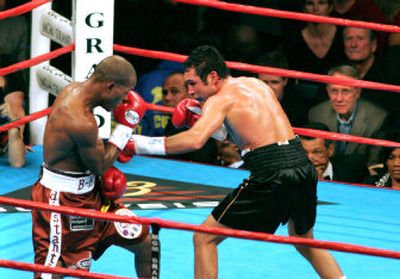Senate minority leader defends free boxing tickets

WASHINGTON – Senate Democratic leader Harry Reid, who has criticized Republican ethics, accepted free ringside tickets to three professional boxing matches from Nevada officials who were trying to influence his federal legislation regulating the sport.
Reid, D-Nev., took the free seats for Las Vegas fights between 2003 and 2005 from the Nevada Athletic Commission as he pressed legislation to increase federal oversight of boxing, including the creation of a government commission.
Reid defended the gifts, saying they would never influence his position on the boxing bill and that he was simply trying to learn how his legislation might affect an important home state industry. “Anyone from Nevada would say, ‘I’m glad he is there taking care of the state’s No. 1 businesses,’ ” he said.
“I love the fights anyways, so it wasn’t like being punished,” added the senator, a former boxer and boxing judge.
At a news conference in Las Vegas on Tuesday, Reid said he would continue to accept free tickets. “I’m going to go whenever I have the opportunity,” he said.
Senate ethics rules generally allow lawmakers to accept gifts from federal, state or local governments but specifically warn against taking such gifts – particularly on multiple occasions – when they might be connected to efforts to influence official actions.
“Senators and Senate staff should be wary of accepting any gift where it appears that the gift is motivated by a desire to reward, influence or elicit favorable official action,” the Senate ethics manual states.
Several ethics experts said Reid should have paid for the tickets, which were close to the ring and worth between several hundred and several thousand dollars each, to avoid the appearance he was being influenced by gifts.
“From what you are describing, it is such a huge risk that a reasonable person with all the relevant facts would say this creates the appearance of impropriety,” said Bernadette Sargeant, a former House ethics lawyer. “The more cautious thing, the more prudent thing, would be to either pay the tickets or fair market value or not accept the tickets in the first place.”
Two senators who joined Reid for fights with the complimentary tickets took markedly differently steps.
Sen. John McCain, R-Ariz., insisted on paying $1,400 for his ticket when he joined Reid for a 2004 championship fight. Sen. John Ensign, R-Nev., accepted free tickets to another fight with Reid but already had abstained from taking any votes or actions on the boxing bill because his father was an executive for a Las Vegas hotel that hosts fights.